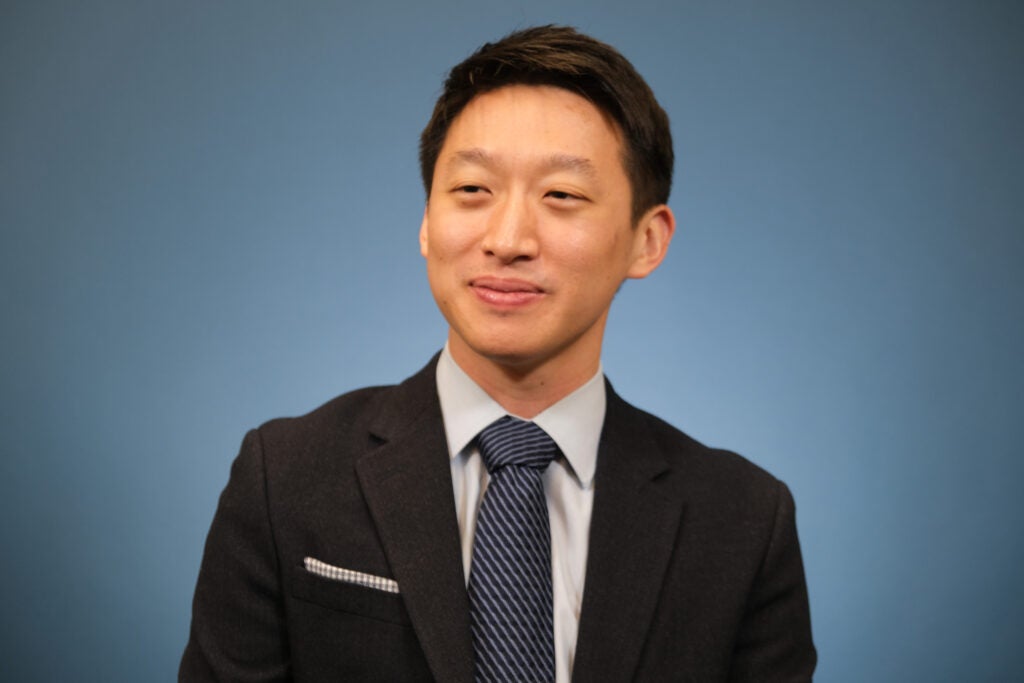In our Five-Question series to mark the 10-year anniversary of Ariadne Labs, we highlight the staff and faculty behind the lab’s compelling work.
Even during his medical training, June-Ho Kim, MD, MPH, Interim Director of Ariadne Labs’ Primary Health Care program, was drawn to the realm of public health and health policy change.
Working in a clinic in Uganda showed him that even though he could successfully treat his HIV-positive patients with antiretroviral therapy and give them the promise of a longer, healthier life, they still faced noncommunicable diseases, medication side effects, vaccine-preventable diseases, and other health issues that required a comprehensive primary health care approach. This experience helped trigger his passion for advancing integrated primary care and treating patients with chronic diseases from underserved settings.
June-Ho earned his A.B. from Harvard College, his MD from the Johns Hopkins University School of Medicine, and his MPH from the Harvard T.H. Chan School of Public Health. He completed his internship, residency, and fellowship in Internal Medicine and Primary Care at Brigham and Women’s Hospital.
He joined Ariadne Labs in 2018 as a research fellow on the Primary Health Care team and has worked in a number of areas, including innovative projects on global PHC measurement, infection control in the early days of the COVID-19 pandemic, and digital health and behavioral health integration. In 2022, he was named Interim Director of the labs’ Primary Health Care program.
Q: Were you always drawn to primary care?
Yes. When I first started medical school, I realized quickly that my perspective was a little different from a lot of my peers who came in very much focused on, for example ‘I want to be an ophthalmologist, let me find the XYZ kind of criteria that you need to do to get into ophthalmology residency.” For me it was: “OK, how do we work on the system to transform it in a way that actually makes sense for the patient.”
Q: What about your interest in systems change?
Right before I went to medical school, I had the opportunity to work as a research assistant with a breast cancer surgeon in San Francisco. And being a surgeon, I think it’s natural to assume she’d be very focused on: “How do I make sure I cut the tumor out?” But her North Star was not about how we cure the cancer by surgery and radiation and whatnot. Those are all important, but she looked at the bigger picture, the whole journey when someone develops breast cancer and the points at which you can intervene across the health system. To the point where, arguably, she might put herself out of a job with prevention and screening techniques so you can catch cancer early enough that it doesn’t progress to something that needs intense treatment.
Q: Was there any meaningful experience that solidified your interest in system change?
The patient that always comes to mind is one that I’ve treated since my first year of medical residency when I worked in a community health center. This was a gentleman with HIV, opioid use disorder, and diabetes. He was going from one provider to another and just living what could arguably be called a pretty chaotic life. By having a continuous relationship, we were able to get him the kind of comprehensive care that he needed rather than dividing him up into a bunch of separate diseases. We were able to address not only his chronic conditions, but also his social needs. He was able to get an apartment where he could have easy access to a pharmacy nearby. When the COVID-19 pandemic happened, he unfortunately got COVID. But he was able to isolate and actually get food delivery to his home. A comprehensive view of support and care has led him to live what I would say is a thriving life.
Q: Why is Ariadne the place to work on these kinds of issues?
I’ve learned while being at Ariadne that when we talk about systems, it may appear to be about a machine– the cog, the wheel, and whatnot. But you realize that a system is about having empathy and compassion for the whole person. It actually means being able to thoroughly understand not only the person’s physical ailments, but their mental concerns and their emotional health and their social situation as well. Once we’re able to see that, then it really kind of transforms the impact that we’re able to have.
Q: Anything else you want to add?
I think this ten year anniversary just comes at such a critical moment at this stage of both the pandemic and as we head into the next decade of trying to recover lost life expectancy. We’ve learned the hard lessons of poor public health and primary care during the pandemic, now let’s see if we can improve on them in the U.S. and around the world in the years ahead.




